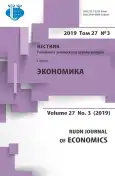Introduction of microgeneration and energy-saving technologies within the concept of green economy: foreign experience and Russia
- Authors: Gomonov K.G.1, Sipakova P.O.1, Chapurnaya A.P.1
-
Affiliations:
- Peoples’ Friendship University of Russia (RUDN University)
- Issue: Vol 27, No 3 (2019)
- Pages: 442-454
- Section: Developed and developing countries economy
- URL: https://journal-vniispk.ru/2313-2329/article/view/342859
- DOI: https://doi.org/10.22363/2313-2329-2019-27-3-442-454
- ID: 342859
Cite item
Full Text
Abstract
The aim of this work is a comparative analysis of the level of development of microgeneration and energy-saving technologies in the framework of the national economy of Russia and the world. The relevance is predetermined by the rapid growth of the investment policy of microgrids and energy-saving technologies based on renewable energy sources (2.6 trillion dollars). Basic information research provided analytical reviews, reports and analytical materials, specialized international departments and agencies, the Ministry of Energy of the Russian Federation, as well as the work of Russian and foreign scientists. Understanding the large-scale tasks related to the development, as well as the development of national and international relations, are an incentive for the pursuit of cleaner, primarily technologies. By 2030, provided that the current course on sustainable development is maintained, the green economy should grow to 10 % of the gross world product. Microenergy is an energy-efficient energy source in the restructuring of Russia's energy sector - the transition from a centralized system, the use of large sources of electricity production, the use of various energy sources that are most suitable for these environmental conditions and the characteristics of natural consumers. Reducing the negative impact of pollution on health and the environment can significantly reduce the burden on the economy, thereby freeing up resources for its growth. The transition of the global economy to a model of green growth will require significant efforts to expand international cooperation. This will require consistent government policies over many years. It is advisable for Russia to join in the development of methodologies and the creation of tools for implementing green initiatives.
About the authors
Konstantin G. Gomonov
Peoples’ Friendship University of Russia (RUDN University)
Author for correspondence.
Email: gomonov_kg@pfur.ru
Ph.D. in Economics, senior lecturer at Department of Economic and Mathematical Modeling
6 Miklukho-Maklaya St., Moscow, 117198, Russian FederationPolina O. Sipakova
Peoples’ Friendship University of Russia (RUDN University)
Email: 1032162260@pfur.ru
4-year bachelor of the Faculty of Economics
6 Miklukho-Maklaya St., Moscow, 117198, Russian FederationAnastasia P. Chapurnaya
Peoples’ Friendship University of Russia (RUDN University)
Email: 1032162253@pfur.ru
4-year bachelor of the Faculty of Economics
6 Miklukho-Maklaya St., Moscow, 117198, Russian FederationReferences
- Attahiru Y., Aziz M., Kassim K., Shahid S., Wan Abu Bakar W., Sashruddin T. et al. (2019). A review on green economy and development of green roads and highways using carbon neutral materials. Renewable and Sustainable Energy Reviews, 101, 600–613. doi: 10.1016/j.rser.2018.11.036.
- Dulal H., Shah K., Sapkota C., Uma G., Kandel B. (2013). Renewable energy diffusion in Asia: Can it happen without government support? Energy Policy, 59, 301–311. doi: 10.1016/j.enpol.2013.03.040.
- García-Álvarez M., Moreno B. (2018). Environmental performance assessment in the EU:
- A challenge for the sustainability. Journal of Cleaner Production, 205, 266–280. doi: 10.1016/j.jclepro.2018.08.284.
- Hirsch A., Parag Y., Guerrero J. (2018). Microgrids: A review of technologies, key drivers, and outstanding issues. Renewable and Sustainable Energy Reviews, 90, 402–411. doi: 10.1016/j.rser.2018.03.040.
- Jensen C., Goggins G., Fahy F., Grealis E., Vadovic, E., Genus A., Rau H. (2018). Towards a practice-theoretical classification of sustainable energy consumption initiatives: Insights from social scientific energy research in 30 European countries. Energy Research and Social Science, 45, 297–306. doi: 10.1016/j.erss.2018.06.025.
- Khavari F., Badri A., Zangeneh A. (2019). Energy management in multi-microgrids considering point of common coupling constraint. International Journal of Electrical Power and Energy Systems, 115, 105465. doi: 10.1016/j.ijepes.2019.105465.
- Gomonov K., Balashova S., Matyushok V. (2019). The relationship of socio-economic deve- lopment and the drivers of green economy. The 13th International Days of Statistics and Economics (September 5–7, 2019, Prague, Czech Republic): Conference Proceedings. doi: 10.18267/pr.2019.los.186.41.
- Li J., Just R. (2018). Modeling household energy consumption and adoption of energy efficient technology. Energy Economics, 72, 404–415. doi: 10.1016/j.eneco.2018.04.019.
- Makarova A.A., Mitrova T.A., Kulagin V.A. (eds.). (2019). Forecast of the development of energy in the world and Russia 2019. Moscow.
- Matyushok V., Sergio B., Balashova S., Gomonov K. (2017). Influence of smart grid and renewable energy sources on energy efficiency: foreign experience. RUDN Journal of Economics, 25(4), 583–598. doi: 10.22363/2313-2329-2017-25-4-583-598.
- Microgrid Deployment Tracker 4Q18. (2019). https://www.navigantresearch.com/reports/ microgrid-deployment-tracker-4q18 (accessed: 16.09.2019).
- Parag Y., Ainspan M. (2019). Sustainable microgrids: Economic, environmental and social costs and benefits of microgrid deployment. Energy For Sustainable Development, 52, 72–81. doi: 10.1016/j.esd.2019.07.003.
- Ratner S.V., Gomonov K.G. (2019). Evaluation of the effectiveness of government support for renewable energy and energy efficiency of the economy: a review of approaches. Economic analysis: theory and practice, 18(8), 1428–1447. https://doi.org/10.24891/ea. 188.11428
- Schlauwitz J., Musilek P. (2016). IEEE Congress on Evolutionary Computation, CEC 2016 (Vancouver, BC, Canada, July 24–29). https://researchr.org/publication/cec-2016 (accessed: 16.09.2019).
- Shafie-khah M., Kheradmand M., Javadi S., Azenha M., de Aguiar J., Castro-Gomes J. et al. (2016). Optimal behavior of responsive residential demand considering hybrid phase change materials. Applied Energy, 163, 81–92. doi: 10.1016/j.apenergy.2015.11.013.
- Sioshansi, F., Mitchell J., Treadwell K. (2019). Microgrids: from niche to $100 billion market. https://energypost.eu/microgrids-from-niche-to-mainstream/ (accessed: 16.09.2019).
- Stadler M., Naslé A. (2019). Planning and implementation of bankable microgrids. The Electricity Journal, 32(5), 24–29. doi: 10.1016/j.tej.2019.05.004.
- Steriotis K., Tsaousoglou G., Efthymiopoulos N., Makris P., Varvarigos E. (2018). A novel behavioral real time pricing scheme for the active energy consumers’ participation in emerging flexibility markets. Sustainable Energy, Grids and Networks, 16, 14–27. doi: 10.1016/j.segan.2018.05.002.
- Walz R., Pfaff M., Marscheider-Weidemann F., Glöser-Chahoud S. (2017). Innovations for reaching the green sustainable development goals –where will they come from? Internatio- nal Economics and Economic Policy, 14(3), 449–480. doi: 10.1007/s10368-017-0386-2.
- Wire B. (2019). North America Regains its Claim as the Leading Region for Microgrid Capacity, According to Navigant Research. https://www.businesswire.com/news/home/ 20160531005124/en/North-America-Regains-Claim-Leading-Region-Microgrid (accessed: 16.09.2019).
Supplementary files









